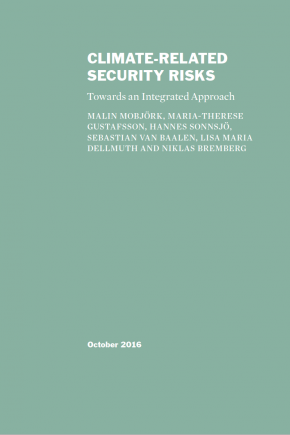Climate-Related Security Risks: Towards an Integrated Approach

The security implications of climate change have attracted increasing attention in policymaking and research circles since the early 2000s. Since climate change has far-reaching implications for human livelihoods and activities, the potential security implications are broad and complex. Responses from different policy communities—foreign affairs, defence, environmental and development—are therefore required. These communities are currently at different stages of developing strategies to integrate climate-related security risks into their work.
This report provides an overview of climate-related security risks and policy responses for addressing those risks. First, it presents findings on six thematic areas in which climate change can pose security risks. Second, it investigates how policy organizations integrate climate-related security risks into their policies and practical work. The analysis provides a deeper understanding of the opportunities and challenges presented by different integration strategies. In doing so, it offers relevant insights and practical alternatives to help address and work with the security risks posed by climate change. This knowledge is prerequisite to policymakers seeking to accurately assess the value of current strategies and identify how policies, strategic guidance, internal organization and procedures could be improved in order to respond better to climate-related security risks.
Preface
Abbreviations
Executive summary
1. Introduction
2. Understanding climate-related security risks
3. Responding to climate-related security risks
4. Towards an integrated approach
Appendix A. Sources, References, Interviews
Appendix B. About the authors


